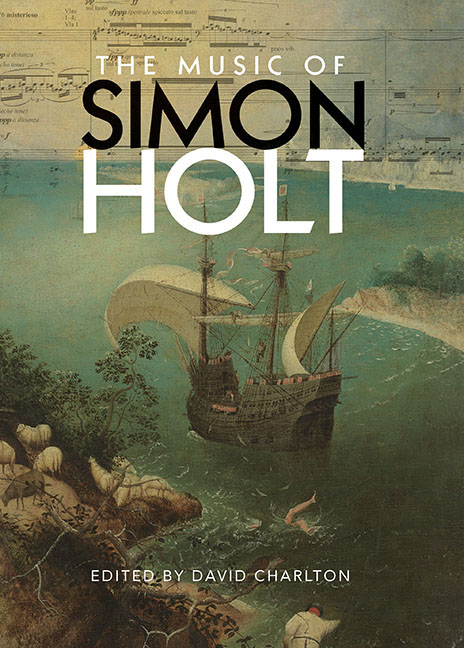Book contents
- Frontmatter
- Contents
- Figures and Tables
- Contributors
- Preface and Acknowledgements
- Abbreviations, with a note on recordings and scores
- Introduction Memories of Magical Moonlight: Simon Holt's years as a composition student
- 1 Duende y Duelos: The Andalusian spirit in the Lorca settings
- 2 An Interplay of Passion and Spirit: The Nightingale's to Blame
- 3 Images in Sound: Movement, harmony and colour in the early music
- 4 Myth and Narrative in 3 for Icarus
- 5 Sound, Sense and Syntax: The Emily Dickinson settings
- 6 Piano Music
- 7 Redefining the Cello's Voice: Musical agency in feet of clay
- 8 Performance and Reflections: Holt's music for oboe and cor anglais
- 9 Shaking the Bars: The Yellow Wallpaper
- 10 Listening to the River's Roar: Stance, texture and space in the concertos
- 11 Orchestral Works in Performance
- 12 Oblique Themes and Still Centres: A conversation between
- 13 Sketching and Idea-Gathering
- 14 Art, Conceptualism and Politics in Holt's music
- Appendix A Overview and Catalogue of Pieces
- Appendix B Texts by Simon Holt for Raju Raghuvanshi is a ghost and The Legend of Melusine
- Bibliography
- Index of pieces by Simon Holt
- General index
2 - An Interplay of Passion and Spirit: The Nightingale's to Blame
Published online by Cambridge University Press: 01 September 2018
- Frontmatter
- Contents
- Figures and Tables
- Contributors
- Preface and Acknowledgements
- Abbreviations, with a note on recordings and scores
- Introduction Memories of Magical Moonlight: Simon Holt's years as a composition student
- 1 Duende y Duelos: The Andalusian spirit in the Lorca settings
- 2 An Interplay of Passion and Spirit: The Nightingale's to Blame
- 3 Images in Sound: Movement, harmony and colour in the early music
- 4 Myth and Narrative in 3 for Icarus
- 5 Sound, Sense and Syntax: The Emily Dickinson settings
- 6 Piano Music
- 7 Redefining the Cello's Voice: Musical agency in feet of clay
- 8 Performance and Reflections: Holt's music for oboe and cor anglais
- 9 Shaking the Bars: The Yellow Wallpaper
- 10 Listening to the River's Roar: Stance, texture and space in the concertos
- 11 Orchestral Works in Performance
- 12 Oblique Themes and Still Centres: A conversation between
- 13 Sketching and Idea-Gathering
- 14 Art, Conceptualism and Politics in Holt's music
- Appendix A Overview and Catalogue of Pieces
- Appendix B Texts by Simon Holt for Raju Raghuvanshi is a ghost and The Legend of Melusine
- Bibliography
- Index of pieces by Simon Holt
- General index
Summary
SIMON HOLT'S ONE-ACT OPERA The Nightingale's to Blame was written between 1996 and 1998 and given its first performance at the Huddersfield Contemporary Music Festival the same year. For this first excursion into the realm of theatre Holt returned to the work of Federico García Lorca. He used David Johnston's translation of the source play, preserving its basic structure: a Prologue and three scenes.
Holt's attraction to the dark, sensuous imagery of Lorca's poetry had resulted, over the previous fourteen years, in four works using words or images from the poems. The opera's title makes direct reference to the bird which the poet used as a symbol for illusion. Lorca's original title for the play was (in translation) The Love of Don Perlimplín for Belisa in the Garden. As a musician himself, he built numerous musical allusions into the play, which has proved attractive to various composers as an opera subject, perhaps most notably Bruno Maderna, whose radiophonic work dates from 1962. Assassinated in 1936 during the Spanish Civil War, Lorca did not live to see any of the operatic adaptions of his text. The work occupied him between 1926 and 1929, but fell foul of Spanish censors prior to its planned first performance in 1929,
ostensibly because the theatre company had failed to observe mourning for the recently deceased Queen Mother, [but] in all likelihood it was because the role of a cuckold was to be acted by a retired army officer, which could have damaged the dignity of the military.
It was finally given in 1933 during the period of the Second Republic.
BACKGROUND TO THE OPERA
The play's main character is Don Perlimplín, an ‘aging bachelor’. In the Prologue, his maid Marcolfa, no younger than he, berates him for having passed his fiftieth year and being still unmarried. She draws his attention to the beautiful Belisa, a sensuous woman easily half his age, highly eligible, who lives next door: we hear her singing. Under Marcolfa's prompting Perlimplín calls out loudly; Belisa appears on her balcony, almost unclothed (b. 355). Perlimplín next pays court to Belisa's mother, who agrees to the match: he is wealthy, after all. As Belisa ‘throws open the shutters on her balcony’ (b. 499), the scene changes.
- Type
- Chapter
- Information
- The Music of Simon Holt , pp. 40 - 55Publisher: Boydell & BrewerPrint publication year: 2017



